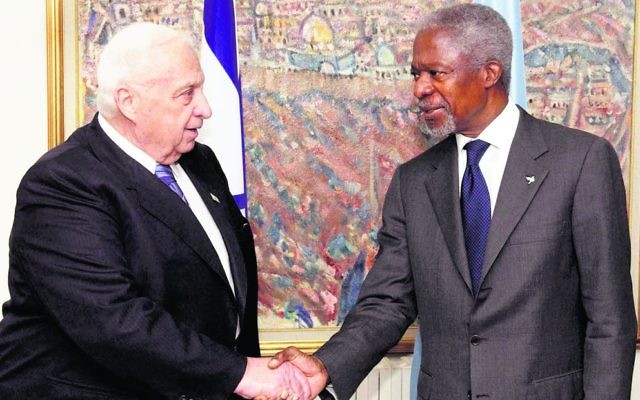Tributes flow for Kofi Annan
Annan’s unshakable stance against anti-Semitism has dominated the tributes to him in Israel and the Jewish world since his death on Saturday, aged 80.
IN 2004, Kofi Annan opened the first ever United Nations conference on anti-Semitism, and declared that the battle against the hatred of Jews “must be our fight, and Jews everywhere must feel that the United Nations is their home”.
Three decades earlier, the UN had decided that Zionism equalled racism. And here was the organisation’s head saying he was “glad” that this resolution was rescinded, admitting that the UN’s record on anti-Semitism has at times “fallen short of our ideals,” and trying to move forward the conversation on fighting anti-Jewish prejudice.
Not only this, but at the conference Annan introduced Elie Wiesel, who said that without Annan’s intervention, the infamous resolution comparing Zionism to racism would still be in effect.
The next year, the UN designated January 27 as International Holocaust Remembrance Day.
Annan’s unshakable stance against anti-Semitism has dominated the tributes to him in Israel and the Jewish world since his death on Saturday, aged 80.
“Kofi Annan, an individual of exceptional dignity, grace, and commitment, demonstrated that positively changing the UN posture towards Israel and the Jewish people is possible,” said David Harris, CEO of the American Jewish Committee, a Jewish advocacy organisation. “While overcoming the world body’s endemic biases is an ongoing, long-term challenge, his singular contributions were pathbreaking.”
The AJC noted that Annan was the first UN Secretary General to use the word “Holocaust,” the first to advocate for ending unjust UN treatment of Israel, and the first to focus on the tragic fate of Raoul Wallenberg, the Swedish diplomat who saved thousands of Hungarian Jews during the war.
Israel’s Prime Minister Benjamin Netanyahu said of Annan, “We will remember him as having been very active in the international arena and as someone who fought anti-Semitism and Holocaust denial.”
Tzipi Livni of the opposition Zionist Union party said, “We worked together when he was Secretary General of the UN and we had arguments as well as a partnership in the fight against anti-Semitism. The desire to act in a better world accompanied him until his death.”
Annan, a Nobel Peace Prize winner, best-known for heading the UN from 1997 to 2006, fought an uphill battle against people who use criticism of Israel as a cover for anti-Semitism.
“When we seek justice for the Palestinians — as we must — let us firmly disavow anyone who tries to use that cause to incite hatred against Jews, in Israel or elsewhere,” he said at the 2004 conference.
The UN under Annan was no pro-Israel fan club — he oversaw the organisation through the challenging days of the Second Intifada and the Second Lebanon War, when Jerusalem was strongly criticised.
Annan formally complained to Israel against the construction of the Security Barrier, took a firm line against settlements, and when an Israeli bomb killed two UN peacekeepers in 2006, he infuriated Israel by suggesting that the strike was “deliberate”.
During the Second Intifada he suggested that Israel had been falsely claiming that Palestinians used ambulances to move weapons, and lashed out against Israeli conduct.
“Israel is fully entitled to defend itself against terror,” he wrote in 2002 to Ariel Sharon, Israel’s prime minister at the time. “But this right does not discharge it of its obligation to respect the fundamental principles and rules of international humanitarian law and the law of armed conflict with respect to the treatment and protection of civilians in occupied territories.”
But as well as criticising, Annan stuck his neck out for Israel, and pushed diplomats to stop obsessing over its actions, while ignoring other pressing issues.
Addressing the UN Human Rights Council in 2006, he said that members should not allow the Arab-Israeli conflict to “monopolise attention at the expense of others where there are equally grave or even graver violations”.
He added, “There are surely other situations, besides the one in the Middle East, which would merit scrutiny by a special session of this Council. I would suggest that Darfur is a glaring case in point.”
A few weeks later, in his last speech to the Security Council, he said, “Some may feel satisfaction at repeatedly passing General Assembly resolutions or holding conferences that condemn Israel’s behaviour. But one should also ask whether such steps bring any tangible relief or benefit to the Palestinians.”
Annan went on to say, “Even worse, some of the rhetoric used in connection with the issue implies a refusal to concede the very legitimacy of Israel’s existence, let alone the validity of its security concerns. We must never forget that Jews have very good historical reasons for taking seriously any threat to Israel’s existence.
“What was done to Jews and others by the Nazis remains an undeniable tragedy, unique in human history. Today, Israelis are often confronted with words and actions that seem to confirm their fear that the goal of their adversaries is to extinguish their existence as a state, and as a people.”
For many Jewish people, in Israel and the Diaspora, Annan showed that one can have differences with Israel but still uphold the country’s basic rights and become a warrior against anti-Semitism.
Eulogising him, World Jewish Congress President Ronald Lauder said, “While his politics were often radically different from those of the Israeli government and the Jewish Diaspora, he made clear his position that the right of the State of Israel to exist was not up for negotiation, nor was the Jewish people’s historic connection to the land.”
NATHAN JEFFAY


comments